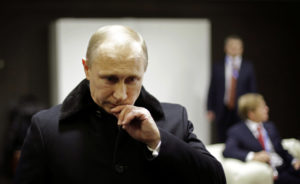The readout from the Politburo meeting published by the Xinhua news agency on 28 March 2022 was the shortest in decades: just 100 characters or so. Apart from a statement of condolence for the tragic China Eastern plane crash a few weeks earlier, there was little discussion of detail: in an exclusive Xinhua scoop, it was revealed that “work of contemporary relevance” was discussed.
The tight-lipped statement didn’t mention Vladimir Putin’s war in Ukraine. But that’s hardly surprising. For much of Europe, the outcome of the war is existential: all eyes are currently on China to see if it will back Putin. Just days before Russia’s invasion, Xi Jinping and Putin announced that the friendship between their two nations had “no limits” and “no forbidden areas of cooperation”. Yet in the weeks since, Xi has been distracted: he has far more pressing issues to worry about than war in far-off Ukraine.
While bombs rain down on Mariupol, Covid remains the main story in China. Much of the rest of world has opened up, including India, but China and Japan remain major outliers. This week, the mega-city of Shanghai, with a population nearly half that of the UK, is being locked down; first, its futuristic eastern zone of skyscrapers and towers, and next week, its western half defined by its British-style art deco waterfront, the Bund.
Stories of commuters emptying shelves in supermarkets fill the headlines, just as in Britain in spring 2020. Hong Kong’s politics is no longer dominated by the struggle for democracy. Instead, public anger, still more freely expressed than in the mainland, has attacked Chief Executive Carrie Lam for a policy that has seen the city isolated from the world and the Chinese mainland for weeks, but still ravaged by growing deaths, particularly among the unvaccinated and elderly.
The economic and social turmoil that Covid has brought to China has shaped its reaction to Ukraine. It is certainly true that China will seek to strengthen its geopolitical position where it can — as indeed does every other major power. However, right now, any decisions on Ukraine will almost certainly be filtered through a domestic lens first and foremost. What will any decision do to the economy? How will it affect the march toward a third term in office for Xi, a decision unprecedented in the modern era but likely to be achieved this autumn at the Party Congress? These are hard questions to answer: no wonder that Xinhua readout was so short.
China’s relationship with Ukraine is part of the equation. Since 2019, China has been Ukraine’s largest single trading partner. And Ukraine is part of China’s Belt and Road Initiative, along with Russia. For years, Ukraine was proof that European powers at odds with the EU could find friends in Beijing; Serbia being another example.
China also imports grain from Ukraine, not in a way that makes it dependent on that supply in the way that some Middle Eastern countries are, but usefully nonetheless. And it has invested heavily in projects in Ukraine such as a metro rail system and wind energy farms, which it would presumably want to keep going in the event of a peace deal. A settlement that allows China to restore Ukraine to its existing place in its economic matrix would be welcome; whether Putin will permit that is another matter.
There are also small, but significant opportunities for China to burnish its global image in its handling of the Ukraine crisis. It has plenty of peacekeeping experience via the UN, and actually has more peacekeeping troops trained than any other permanent member of the UN security council. In theory, then, its troops could be part of a UN force that keeps order, assuming that Russian soldiers would be unacceptable to the Ukrainians.
However, this remains unlikely, even if the UN does play a central role in any potential settlement. Past experience shows that China is uncomfortable with the political aspects of peacekeeping — particularly post-civil conflict resolution in sub-Saharan Africa — as it involved bringing civil society and opposition groups into authorised dialogue with government, something which China does not do at home.
Overall, China is much more comfortable talking about physical and economic reconstruction, as it did when it offered to build roads for the Taliban regime last year. But cash alone is not going to settle the Ukraine situation. As its relative distance from the current talks in Istanbul have shown, China is not yet ready to step up as a prominent mediator with a democratic state, just as Western actors have sometimes struggled in the past to deal with hybrid or semi-authoritarian states.
There is another area where China may use Ukraine for political rethinking: on Taiwan. It is far too simple to read Taiwan as a direct analogy to Ukraine, and Beijing does not do so. It has been thinking about the Taiwan issue for years, and regards it as a matter of internal politics, not an external breach of sovereignty. However, one revelation from the past month should surely have set alarm bells ringing: the massive miscalculation by Russia’s political and military elites about the nationalist sentiment and will for resistance of the Ukrainian people.
The case of Russia suggests that a propaganda echo chamber does not produce good intelligence; if you only listen to your own propaganda, you can’t be surprised when it turns out to be wrong. There are thoughtful voices in the Chinese foreign policy world, muted but audible, that have suggested that China should take its own rhetoric about the decadence and weakness of the West with a pinch of the delicious weijing that makes much Chinese food so sharp.
The Chinese Communist Party has reportedly introduced a programme in selected universities and schools to educate children on the correct approach to understanding the “tragedy” of the Ukraine situation. The overall message is that the crisis is the fault of the West, and Chinese sympathy should take Russia’s feelings into account. Yet the programme still pulls its punches, and it’s still a long way from all-out support for Moscow.
According to the South China Morning Post, one university pledged to provide “positive guidance to ignite their learning passions as the Russia-Ukraine situation remains a hot topic for students,” while another addressed “the fundamental causes to Ukraine’s national tragedy.” But a clear direction on who is right and who is wrong is singularly lacking.
Like the rest of the world, China is going through a period of maximal uncertainty. Just as in recent years the British have adopted the term “permacrisis” to describe the endless rolling news cycle, the Chinese now speak of the world “going through major changes not seen for a century” (“bainian weiyou zhi da bianju”). China may have a five-year plan for its economy, but right now, regarding Ukraine, it appears that Beijing is as uncertain as the rest of us as to what the next five minutes might bring.
Disclaimer
Some of the posts we share are controversial and we do not necessarily agree with them in the whole extend. Sometimes we agree with the content or part of it but we do not agree with the narration or language. Nevertheless we find them somehow interesting, valuable and/or informative or we share them, because we strongly believe in freedom of speech, free press and journalism. We strongly encourage you to have a critical approach to all the content, do your own research and analysis to build your own opinion.
We would be glad to have your feedback.
Source: UnHerd Read the original article here: https://unherd.com



